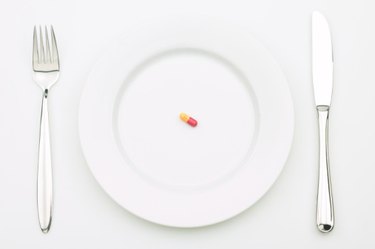
Taking a diet pill in conjunction with adopting a healthy lifestyle is a decision that should always be discussed with your doctor. Even if the pill is sold over the counter and does not require a prescription, it may be dangerous for you because of an existing medication or condition. What most people don't think about, however, is what happens after you stop taking the pill. Unfortunately, because of a variety of physical and psychological reasons, weight gain after stopping diet pills is very common. It's one great reason to use caution before deciding to take diet pills in the first place.
Water Weight
Video of the Day
Many diet pills contain diuretics, which are drugs that temporarily affect your weight by causing you to lose water. Because our bodies are made of 60 percent water, this affect can add up to quite a few pounds. When you stop taking the diet pill, the water weight will come back immediately, and may result in a dramatic and sudden weight loss. According to the MayoClinic.com, some dietary supplements that may have a diuretic effect include dandelion, ginger and juniper. Avoiding diet pills with these ingredients may help you avoid the post-pill water weight rebound effect.
Video of the Day
Increased Appetite
Diet pills, both prescription and over-the-counter, commonly work by suppressing the appetite. For example, phentermine is a prescription-only drug that is similar in molecular structure to an amphetamine and works by diminising hunger. According to MayoClinic.com, those who lose weight on the pill are likely to regain it once they stop taking it. One reason for this is that when you are taking an appetite-suppressing weight loss drug, it may be easy for you to stay within your calorie range because you are simply not hungry often. You are not actually learning the modified behaviors that are essential to a healthy lifestyle, though. When you stop the drug and your appetite returns, you may return to the same behaviors that caused you to gain weight in the first place. To combat this, you should make an effort to exercise and eat healthily even if your appetite is suppressed enough to cause weight loss on its own.
Decreased Energy
Another way diet pills work is by boosting your energy and your endurance. Thus, you are more motivated to work out and you can work out for longer, burning more calories. For example, caffeine is a stimulant that is commonly added to diet pills. Caffeine makes many people jittery, stimulated and alert. According to Rice University, caffeine may enhance performance and may also reduce the perceived effort exerted during a workout. If you are taking a pill with a stimulant to power through your workouts, and you quit, you may find yourself lacking the energy to continue exercising, and gain weight that way. To fight this effect, use food to power your workouts instead, by eating a nutritionally sound and balanced diet.
Muscle Loss
Sometimes a diet pill can work too well. This means that it can depress your appetite to the point that you don't eat enough calories and lose weight rapidly. Though many people would love for this to happen, it is not in fact ideal. Losing weight too quickly is unsafe and losing weight too quickly because of too large a calorie deficit usually means that you are losing a lot of muscle in addition to fat. Generally, you should not attempt to lose more than 1 to 2 lbs. of fat per week. If you eat too few calories, your body will start breaking down muscle tissue for energy. Too few calories depends on your weight and height, and activity level, but women and men are warned not to intake fewer than 1,200 and 1,500 calories, respectively. If you lose too much muscle mass, you can expect to gain weight because muscle takes more energy to maintain than fat. Therefore, a person with less than an average amount of muscle will burn fewer calories. To combat this effect, ensure that you are always eating enough calories every day, even if you are not hungry. Supplementing with nutrition drinks is a good way to get enough calories in when you aren't hungry enough to eat.